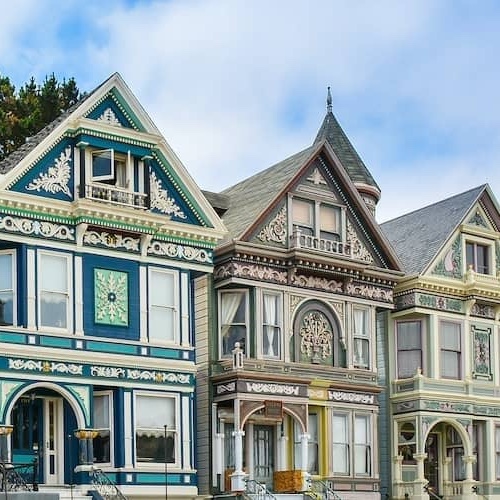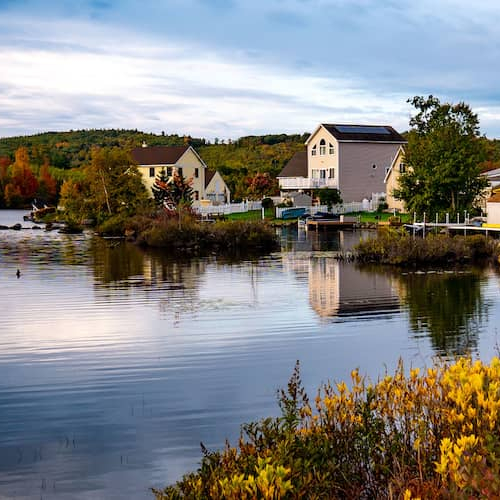Buying a historic home: The pros and cons
Contributed by Karen Idelson
Sep 8, 2025
•10-minute read

Buying a historic home can make you feel like you are part of something meaningful that has made a mark on history. Purchasing a historic home is just like buying a regular home in many ways, but owning one also comes with some drawbacks like taking on extra responsibilities and costs. For some buyers, the character and potential benefits, such as tax incentives, can make purchasing one worthwhile.
Read on as we walk through the pros and cons of buying a historic home so you can decide if owning a piece of history is right for you.
What is a historic home?
Historic homes are a specific type of property full of character and meaningful ties to the past. They've earned special recognition for their cultural or architectural significance. In the U.S., some of these homes are listed on the National Register of Historic Places because they help tell the story of American history and heritage.
The National Historic Preservation Act became law in 1966, officially recognizing that historic places across the country should be preserved and protected.
What makes a home historic?
Just because a home is old or doesn’t automatically make it historic. To qualify for the official designation, there are specific requirements it has to meet.
The National Park Service (NPS) designates a home historic if it meets the following requirements:
- It’s at least 50 years old (though there are a few exceptions).
- It’s tied to an important event in history.
- It’s linked to someone who played a significant role in the past.
- It’s designed by a well-known architect or reflects a classic style.
- It’s helped those who are able to see and experience the house learn more about history.
It's important to point out that some properties may qualify for local historic designation even if they don’t meet national standards. That said, it’s worth checking with your city or state’s preservation office to understand what qualifies in your area.
What is a historic district?
Historic districts are neighborhoods where the buildings and surroundings are protected by special rules to help preserve their character. These rules, also called historic district ordinances, are local laws created by communities with permission from the state.
Being part of a historic district means your home or building is considered an important piece of the area’s history or architecture. It also means your property helps contribute to the overall charm and story of the neighborhood, which is why it’s protected.
Designations can happen at the federal, state, or local level. However, properties recognized in local historic districts typically have the most detailed guidelines. This means homeowners in these districts must follow specific rules and usually need permits for any work that impacts the exterior of their homes. Once an area is designated as historic, every property owner in the district must commit to upholding the integrity and historic charm of their home.
How to find and finance a historic home
Shopping and buying a historic home usually take more planning and preparation. Here are some steps to take to help you better navigate the process.
- Determine a budget and pinpoint the features that matter most to you, like vintage finishes or classic design elements. Remember to include other costs such as closing costs and your down payment in your budget.
- Work with a real estate agent who has experience with historic properties and understands the unique requirements and local regulations.
- Tour multiple homes to get a sense of what's available, what’s been preserved, and what types of updates or repairs might be needed.
- Get preapproved or verified for financing before making an offer so you're ready to move quickly when the right home comes along.
- Order a detailed home inspection, ideally from an inspector who understands the ins and outs of historic homes. It's important to work with an inspector who knows exactly what to look for in terms of structure, materials, and potential restoration needs.
- Research renovation and maintenance costs specific to historic homes. Typically, they require specific materials and labor, which can increase the cost of any project—big or small.
- Check local rules and restrictions to understand what types of changes are allowed under historic preservation guidelines.
Financing a historic home
Financing a historic home can also look a little different than financing a newer property. Start by reaching out to your local and state historic preservation office, since they usually have helpful information about area-specific programs, grants, or tax incentives for buyers and homeowners. You can also check out websites like the National Trust for Historic Preservation to browse current listings.
Depending on the situation, you may need to combine several funding sources to make the numbers work. This may include a traditional home mortgage, federal and state historic tax credits, local preservation grants, or low-interest loans designed specifically for historic renovations. On top of that, you also need a budget for upfront expenses, such as your down payment and closing costs. Using these resources can make a big difference in offsetting some of the cost of repairs and restoration.
Keep in mind, though, that there can be a few extra hurdles when it comes to financing and insuring a historic property. In addition to meeting debt-to-income requirements, credit criteria, and other basic lender requirements, appraisals may be trickier, inspection standards may be stricter, and standard homeowners insurance might not be enough. So be prepared to shop around for specialized coverage.
Note: Using a home affordability calculator can help you get a better idea of your budget before you start your search.
What are the benefits of buying a historic home?
Historic homes offer unique charm and vibrant craftsmanship that’s hard to duplicate in today’s world. But their appeal isn’t all they have to offer. For many homebuyers, it’s also an opportunity to invest in something that adds cultural value and potential financial benefits. Here’s a closer look at why a historic home might be advantageous.
Owning a unique piece of history
Some buyers may look at historic homes as more than just a place to live. They may provide the buyer a meaningful connection to the past. These individuals are often drawn to unique architecture, rich character, and properties that tell a story. Rather than solely focusing on today’s modern amenities, they are guided by an appreciation for design, history, and the irreplaceable charm found in older homes.
Joining a community committed to preservation
When you buy a historic home, you may also have to commit to strict maintenance and preservation guidelines set by local municipalities. So, if you have a love for history or nuanced architectural charm, buying a historic home can provide a meaningful way to feel connected to the past, without even leaving your front door.
Preserving and restoring one of these homes can feel rewarding since you’re often working alongside other homeowners who are passionate about keeping the community’s history alive.
Receiving a higher return on your investment
When neighbors work together to maintain their historic homes, it doesn’t just protect the neighborhood’s character and curb appeal; it can also increase property values and attract more tourists. In fact, according to recent data from PlaceEconomics, homes in well-maintained historic districts are worth about 2.5 times more per acre than those in other parts of the city.
The charm of these neighborhoods and ongoing revitalization efforts typically play a big part in that increase.
Getting financial assistance for renovations
As a historic homeowner, you may be able to save money on renovations through Federal Historic Tax Credits (also known as Historic Rehabilitation Tax Credits). These credits are designed to make fixing up historic buildings more affordable. They work by giving tax breaks to people who restore and reuse certified historic properties, especially in areas that are lower-income or economically struggling.
Over 70% of states also offer their own version of this credit, which can sometimes cover up to 25% of qualifying renovation costs related to preserving an eligible historic property. To qualify for this credit, your home must either be individually listed on the National Register of Historic Places or be part of a historic district that’s on the Register—and considered a contributing property within that district.
One important caveat: the home usually needs to generate some kind of income to be eligible.
But this tax credit isn’t the only way to offset the costs of a historic home renovation. Some states and organizations also offer grants and loan programs to help cover some of the costs, like the National Endowment for the Humanities and the Route 66 Corridor Preservation Program in California. It’s also worth researching historic preservation easements, since they can come with valuable tax benefits.
These tax credits and grants can go a long way in helping cover some of the renovation costs, whether you're a first-time homebuyer or a vet.
What are the downsides of buying a historic home?
Buying a historic home also comes with its fair share of drawbacks, which are important to weigh when deciding if this type of home makes sense for you.
Stricter regulations and complicated renovations
Even if you qualify for a grant, tax credit, or other financial support to renovate a historic home, be prepared for extra oversight. While some areas may have light restrictions, others, like tourist-heavy historic districts, tend to have strict maintenance and renovation guidelines, sometimes even stricter than a typical homeowners association (HOA).
Such strict guidelines can make it more challenging to update your home the way you want since you’ll usually need a permit or approval for any changes. It’s also important to note that these rules don’t just apply to major projects like additions, they can also apply to small updates, like getting approval for a new paint color.
Although these rules are meant to help preserve the home, they can limit your creative freedom.
So, before buying a historic property, be sure to review the local rules. Renovation approvals can take months (or even years), and if you’re not truly passionate about preserving history or following the guidelines, the process may feel more frustrating than fulfilling.
Additional costly and frequent repairs
Not only do you usually have to follow more rules as a historic homeowner, but repairs and maintenance can also get expensive and overwhelming. That’s often due to the home’s age, outdated systems like wooden framing or iron pipes, and the need to use specific, historically accurate materials.
On top of that, older homes can come with hidden problems—like foundation cracks or a failing roof—that may lead to major (and costly) repairs.
So, when you compare the repair and maintenance costs to those of a newer home, the added expense of owning a historic property may not be worth it for everyone.
Added difficulty acquiring insurance and financing
Getting a loan or insurance for a historic home can be a bit trickier than it is for a newer one. Along with the usual paperwork, lenders might ask for extra documentation, like deed history or proof that the home is officially recognized as historic, before giving the green light on the home loan.
While it’s possible to qualify for financing, your options might be a little bit more limited. FHA loans, for example, require the home to meet minimum property standards to make sure it’s safe, sound, and secure. That added scrutiny can make it harder to get approved. With this in mind, make sure you’re preapproved before you submit an offer on a historic home so your financing doesn’t fall apart at the last minute.
Getting homeowners insurance can also present a challenge. Unlike newer homes, many historic properties are built with rare or expensive materials that are harder to replace. That makes it difficult for insurers to estimate how much it would actually cost to repair or rebuild the home.
In some cases, a standard homeowners insurance policy is enough. But if the property is listed on the National Register of Historic Places or recognized as a local landmark, you’ll likely need a specialized policy designed for historic homes.
Resale can be challenging
Selling a historic home isn’t always a walk in the park. Since these homes appeal to a specific type of buyer, you’ll need to find someone who is just as passionate about the charm (and the upkeep) as you are.
Selling a home can take time. And selling a historic home could take additional time because there are fewer buyers in the market for a historic home. So, if you’re thinking about buying one, just keep in mind that you might be there longer than you anticipated.
Limited financing options
Historic homes may also have limited financing options due to the special nature of these properties. You will likely be asked for additional documentation showing the condition of the property as well as its designation as a historic home.
Local preservation offices in your area may offer grants and other types of funding for the maintenance and upkeep of a historic property. Be sure to reach out to one of these offices in your area to see what is available.
Even with help from historic preservation offices, owners of these homes should expect extra costs for specialized insurance, challenges with inspections, stricter inspection criteria, and the potential for many unexpected repairs that come with an older home.
Tips for caring for a historic house
Historic homes typically require more care and maintenance than your average property. Therefore, to help keep yours in tip-top shape, here are a few tips:
- Keep a record of your home’s original features. Take photos and notes of key design details. Doing this can help you match the existing style during repairs and preserve the home’s architectural character.
- Work with preservation pros. Hiring experts who specialize in historic properties, like preservation architects or contractors, can save you time, money, and mistakes. They know how to handle the unique materials and requirements these homes often have. Look for professionals, such as preservation architects or specialists in historic buildings, who have the training and experience to guide you.
- Tackle issues early on to avoid bigger repairs later. Older homes often feature unique elements such as crown molding, columns, trim, hardwood floors, tile, and windows that require a little extra care and attention.
- Stay on top of routine maintenance. The unique details that give your home its historic charm, like original woodwork or exterior trim, may need special care, like regular cleaning, waxing, or painting. Due to your home’s age, you may need to inspect it more frequently to maintain its good condition.
- Research financial incentives. From tax credits to grants to low-interest loans, there are programs available designed to help offset the cost of preservation and maintenance with historic properties—you just have to know where to look. Many of these programs are offered at the federal, state, and local levels. For example, you might qualify for federal tax incentives or grants through the Historic Preservation Fund.
The bottom line: Owning a historic home may be a good decision for you
A historic home’s beautiful architecture, allure, and story can make it feel like you're living in your own movie. But it also comes with more upkeep and commitment.
Even though there are advantages like tax credits, grants, and the pride of preserving something special, you’ll also need to navigate strict preservation and renovation rules, as well as higher maintenance demands. It can also be more challenging to find financing or insurance.
Before you make an offer, make sure you're backed by a Verified Approval Letter. Apply online with Rocket Mortgage®.

Ashley Kilroy
Ashley Kilroy is an experienced financial writer. In addition to being a contributing writer at Rocket Homes, she writes for solo entrepreneurs as well as for Fortune 500 companies. Ashley is a finance graduate of the University of Cincinnati. When she isn’t helping people understand their finances, you may find Ashley cage diving with great whites or on safari in South Africa.
Related resources

10-minute read
How to buy a cabin or cottage in 2023: A step-by-step guide
How do you find the ideal cottage to buy? These small and cozy homes are ideal for minimalists. Here’s what you should know to buy a cottage or a cabin...
Read more
6-minute read
Green architecture: What is it, and what are its goals?
Green architecture is a design movement committed to building homes that don’t damage our environment. Learn more about the principles of green archite...
Read more
9-minute read
Starter home or forever home: Which is right for you?
A starter home is a small, affordable home for first-time buyers. Find out if it makes sense to buy a starter home or if a forever home is right for you.
Read more